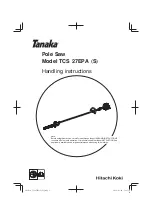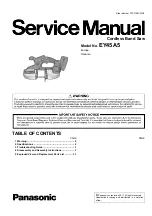
10
11
SAFETY WARNINGS AND INSTRUCTIONS:
Charging The Battery Pack
• This manual contains important safety and operating instructions.
• Before using the battery charger, read and become familiar with all of the use
instructions and caution markings on the battery charger, battery pack, and product
using battery pack.
• CAUTION: Always use MOTORHEAD battery packs to reduce the possibility of injury;
other battery types may burst, causing potentially harmful results.
• Keep the charger out of bad elements, such as rain and snow.
• Be sure that any attachments are recommended or sold by MOTORHEAD;
use of
attachments by other manufacturers may not meet the same requirements and can result
in fire, electric shock, or injury.
• Never pull by the cord -
always pull by the plug when disconnecting the charger.
• Make sure the cord is clear and secure -
do not step on, trip or otherwise damage or
stress the cord.
• Extension cords - refer to ELECTRICAL SAFETY (CONT.) - EXTENSION CORD USE in
this manual.
• Use only the supplied charger when charging your Reciprocating Saw.
hazardous or damage the Reciprocating Saw.
• Use only one charger when charging.
• Never open the charger or power tool - there are no parts inside that are serviceable
by the customer.
Return the power tool to MOTORHEAD for service.
• Never attempt to open or modify battery for any reason.
Released electrolyte is
corrosive and may cause damage to eyes and skin. It may be toxic if swallowed.
• NEVER incinerate the power tool or battery pack when they are ready to be discarded.
The batteries can explode in a fire.
• There are certain conditions, such as extreme usage, charging or temperature
conditions that can result in a small amount of leakage from the battery pack cells.
This
does not indicate a failure - however, should the outer seal get broken and the leakage
touches your skin:
a. Immediately wash with soap and water.
b. Neutralize with a mild acid such as lemon juice or vinegar.
c. In case the battery liquid gets in your eyes, flush your eyes with clean water for a
minimum of 10 minutes and seek immediate medical attention. MEDICAL NOTE: the
liquid is a 25-35% solution of potassium hydroxide.
WARNING: Dust from use of this tool on construction material may cause serious
and/or permanent respiratory (or other) injury.
Direct the particles away from your face,
and be sure to use NIOSH/OSHA approved respiratory protection against dust exposure.
Vibration Safety
This tool vibrates during use. Repeated or long-term exposure to vibration may cause
temporary or permanent physical injury, particularly to the hands, arms and shoulders. To
reduce the risk of vibration-related injury:
• Anyone using vibrating tools regularly or for an extended period should first be examined
by a doctor and then have regular medical check-ups to ensure medical problems are not
being caused or worsened from use. Pregnant women or people who have impaired
blood circulation to the hand, past hand injuries, nervous system disorders, diabetes, or
Raynaud’s Disease should not use this tool. If you feel any symptoms related to vibration
(such as tingling, numbness, and white or blue fingers), seek medical advice as soon as
possible.
• Do not smoke during use. Nicotine reduces the blood supply to the hands and fingers,
increasing the risk of vibration-related injury.
• Use tools with the lowest vibration when there is a choice.
• Include vibration-free periods each day of work.
• Grip tool as lightly as possible (while still keeping safe control of it). Let the tool do the
work.
• To reduce vibration, maintain the tool as explained in this manual. If any abnormal
vibration occurs, stop use immediately.
• Don't use water on your work surface -
this tool is not waterproofed.
• Always ventilate your working area adequately.
• Make sure to use appropriate respiratory protection.
Use of this tool on some paints,
wood and particular products may produce dust containing hazardous substances.
WARNING: Do not allow the terminals of the battery to contact metal objects when
carrying or storing the battery.
If the battery terminals come in contact with conductive materials, it can cause fires - so
use caution when transporting the battery. NOTE: the US Department of Transportation
Hazardous Material Regulations (HMR) prohibit transporting batteries in commerce or on
airplanes (i.e. packed in suitcases and carryon luggage) UNLESS they are properly
protected from short circuits. Take special precaution when transporting individual
batteries to make sure the terminals are well insulated and protected from anything that
could contact them and cause a short circuit.
ALWAYS FOLLOW THE SAFETY RULES FOR USE OF THIS PRODUCT.
You can
get seriously hurt by using this tool unsafely or incorrectly.
• Always use caution, particularly if operating the power tool around electrical wiring.
Your tool has insulated gripping surfaces - be sure to hold the power tool by these
surfaces to avoid electrical shock if the cutting part of the tool should make contact with
a "live" wire.
• Only operate the tool when you are securely holding it with both hands;
do not leave
the tool running.
SYMBOLS
For your easy reference, here are the tools symbols you may see on your tool label:
20V ULTRA Reciprocating Saw 2Ah KIT
(MH-03-RS-B1-0-1)
20V ULTRA Reciprocating Saw 2Ah KIT
(MH-03-RS-B1-0-1)




































